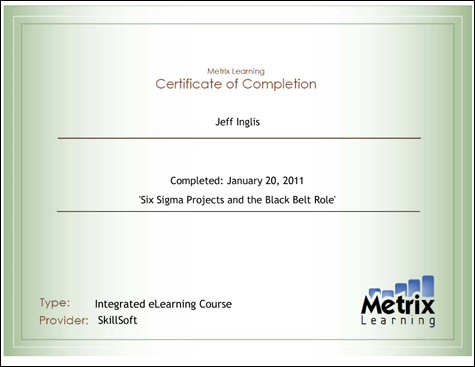
WHAT’S THAT? There’s my certificate. Now please tell me what ‘Six Sigma’ is. |
Yes, taking classes online is the wave of the future. And you've figured out that the house always wins: Tuition for those classes is vastly more profitable for universities than the traditional in-person, in-classroom instruction.
Students live off-campus (requiring fewer dorms), don't even visit campus (less parking), are too far away to use the gym or the library (allowing smaller facilities), and only interact with faculty through computers (fewer tenure-track profs mucking around with academic freedom).
What's the benefit for students? Well, you can keep your full- or part-time job, you don't have to move, and, uh, you get to shell out basically the exact same tuition rate as the on-campus students who get all the perks you're paying for but can't have. The theory, of course, is that the piece of paper saying you earned X credits at your university is worth the same amount of money whether you attend class in person or virtually. (Yes, we know that's ridiculous, because you're not paying for the piece of paper, but the learning experience — right?)
Fortunately, Southern Maine Community College has found a middle ground: Super-extra-cheapo courses, with a basic online learning experience that won't make you poor or frustrated. At $99 for 90 days of as many courses as you can take (some will soon be available for college credit!), even if you snicker at the class notes (as I did, a few times, during a trial run), you'll still be getting your money's worth. The system is available to anyone, anywhere — no Maine residency required.
As many as 5000 different courses will be available when the system is fully up and running in the next few months, according to Julie Chase, assistant dean for professional education at SMCC. Let's not get silly; many of these "courses" might more properly be called "class sessions" — they take anywhere between 90 minutes and five hours. But still, that's a lot of options.
You can search for classes or career paths. I started by testing the system with something I know well — I searched its directory of potential careers and found "reporter," which led me to several courses it suggested I take to prepare for my career: "Foundations of Grammar," "Generating Creative and Innovative Ideas," "Writing With Intention," and "Crisp Composition" were among them. All in all, the units totaled 27.5 hours of time, if I sat through every explanatory session.
I began with "Foundations of Grammar" — a surprisingly nitpicky class that nevertheless had some grammatical errors itself (one example sentence handled a possessive in a way best described as Very Wrong: "Mr. Neal, our bookkeeper's, office is on the second floor.").
The not-so-secret secret key to this type of class is that success is defined by the score you get on the tests. If you like, you can start each class with a pre-test, which, as it turns out, is the same as the post-test.
If you pass enough on the pre-test, you are considered to have completed the course, and can move on to the next. (Yes, you can click through the class slides anyway, but why?) If you haven't passed, it'll tell you what parts you need to work on.